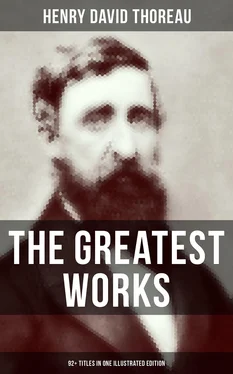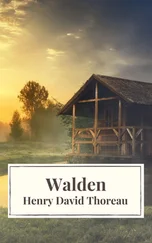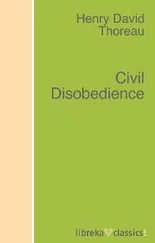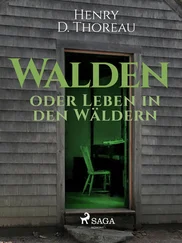I believe that what so saddens the reformer is not his sympathy with his fellows in distress, but, though he be the holiest son of God, is his private ail. Let this be righted, let the spring come to him, the morning rise over his couch, and he will forsake his generous companions without apology. My excuse for not lecturing against the use of tobacco is, that I never chewed it, that is a penalty which reformed tobacco-chewers have to pay; though there are things enough I have chewed which I could lecture against. If you should ever be betrayed into any of these philanthropies, do not let your left hand know what your right hand does, for it is not worth knowing. Rescue the drowning and tie your shoestrings. Take your time, and set about some free labor.
Our manners have been corrupted by communication with the saints. Our hymn-books resound with a melodious cursing of God and enduring Him forever. One would say that even the prophets and redeemers had rather consoled the fears than confirmed the hopes of man. There is nowhere recorded a simple and irrepressible satisfaction with the gift of life, any memorable praise of God. All health and success does me good, however far off and withdrawn it may appear; all disease and failure helps to make me sad and does me evil, however much sympathy it may have with me or I with it. If, then, we would indeed restore mankind by truly Indian, botanic, magnetic, or natural means, let us first be as simple and well as Nature ourselves, dispel the clouds which hang over our own brows, and take up a little life into our pores. Do not stay to be an overseer of the poor, but endeavor to become one of the worthies of the world.
I read in the Gulistan, or Flower Garden, of Sheik Sadi of Shiraz, that “they asked a wise man, saying: Of the many celebrated trees which the Most High God has created lofty and umbrageous, they call none azad, or free, excepting the cypress, which bears no fruit; what mystery is there in this? He replied, Each has its appropriate produce, and appointed season, during the continuance of which it is fresh and blooming, and during their absence dry and withered; to neither of which states is the cypress exposed, being always flourishing; and of this nature are the azads, or religious independents. — Fix not thy heart on that which is transitory; for the Dijlah, or Tigris, will continue to flow through Bagdad after the race of caliphs is extinct: if thy hand has plenty, be liberal as the date tree; but if it affords nothing to give away, be an azad, or free man, like the cypress.”
COMPLEMENTAL VERSES
The Pretensions of Poverty
Thou dost presume too much, poor needy wretch,
To claim a station in the firmament
Because thy humble cottage, or thy tub,
Nurses some lazy or pedantic virtue
In the cheap sunshine or by shady springs,
With roots and pot-herbs; where thy right hand,
Tearing those humane passions from the mind,
Upon whose stocks fair blooming virtues flourish,
Degradeth nature, and benumbeth sense,
And, Gorgon-like, turns active men to stone.
We not require the dull society
Of your necessitated temperance,
Or that unnatural stupidity
That knows nor joy nor sorrow; nor your forc’d
Falsely exalted passive fortitude
Above the active. This low abject brood,
That fix their seats in mediocrity,
Become your servile minds; but we advance
Such virtues only as admit excess,
Brave, bounteous acts, regal magnificence,
All-seeing prudence, magnanimity
That knows no bound, and that heroic virtue
For which antiquity hath left no name,
But patterns only, such as Hercules,
Achilles, Theseus. Back to thy loath’d cell;
And when thou seest the new enlightened sphere,
Study to know but what those worthies were.
T. CAREW
Where I Lived, and What I Lived For
Table of Contents
At a certain season of our life we are accustomed to consider every spot as the possible site of a house. I have thus surveyed the country on every side within a dozen miles of where I live. In imagination I have bought all the farms in succession, for all were to be bought, and I knew their price. I walked over each farmer’s premises, tasted his wild apples, discoursed on husbandry with him, took his farm at his price, at any price, mortgaging it to him in my mind; even put a higher price on it — took everything but a deed of it — took his word for his deed, for I dearly love to talk — cultivated it, and him too to some extent, I trust, and withdrew when I had enjoyed it long enough, leaving him to carry it on. This experience entitled me to be regarded as a sort of real-estate broker by my friends. Wherever I sat, there I might live, and the landscape radiated from me accordingly. What is a house but a sedes, a seat? — better if a country seat. I discovered many a site for a house not likely to be soon improved, which some might have thought too far from the village, but to my eyes the village was too far from it. Well, there I might live, I said; and there I did live, for an hour, a summer and a winter life; saw how I could let the years run off, buffet the winter through, and see the spring come in. The future inhabitants of this region, wherever they may place their houses, may be sure that they have been anticipated. An afternoon sufficed to lay out the land into orchard, wood-lot, and pasture, and to decide what fine oaks or pines should be left to stand before the door, and whence each blasted tree could be seen to the best advantage; and then I let it lie, fallow, perchance, for a man is rich in proportion to the number of things which he can afford to let alone.
My imagination carried me so far that I even had the refusal of several farms — the refusal was all I wanted — but I never got my fingers burned by actual possession. The nearest that I came to actual possession was when I bought the Hollowell place, and had begun to sort my seeds, and collected materials with which to make a wheelbarrow to carry it on or off with; but before the owner gave me a deed of it, his wife — every man has such a wife — changed her mind and wished to keep it, and he offered me ten dollars to release him. Now, to speak the truth, I had but ten cents in the world, and it surpassed my arithmetic to tell, if I was that man who had ten cents, or who had a farm, or ten dollars, or all together. However, I let him keep the ten dollars and the farm too, for I had carried it far enough; or rather, to be generous, I sold him the farm for just what I gave for it, and, as he was not a rich man, made him a present of ten dollars, and still had my ten cents, and seeds, and materials for a wheelbarrow left. I found thus that I had been a rich man without any damage to my poverty. But I retained the landscape, and I have since annually carried off what it yielded without a wheelbarrow. With respect to landscapes,
“I am monarch of all I survey,
My right there is none to dispute.”
I have frequently seen a poet withdraw, having enjoyed the most valuable part of a farm, while the crusty farmer supposed that he had got a few wild apples only. Why, the owner does not know it for many years when a poet has put his farm in rhyme, the most admirable kind of invisible fence, has fairly impounded it, milked it, skimmed it, and got all the cream, and left the farmer only the skimmed milk.
The real attractions of the Hollowell farm, to me, were: its complete retirement, being, about two miles from the village, half a mile from the nearest neighbor, and separated from the highway by a broad field; its bounding on the river, which the owner said protected it by its fogs from frosts in the spring, though that was nothing to me; the gray color and ruinous state of the house and barn, and the dilapidated fences, which put such an interval between me and the last occupant; the hollow and lichen-covered apple trees, nawed by rabbits, showing what kind of neighbors I should have; but above all, the recollection I had of it from my earliest voyages up the river, when the house was concealed behind a dense grove of red maples, through which I heard the house-dog bark. I was in haste to buy it, before the proprietor finished getting out some rocks, cutting down the hollow apple trees, and grubbing up some young birches which had sprung up in the pasture, or, in short, had made any more of his improvements. To enjoy these advantages I was ready to carry it on; like Atlas, to take the world on my shoulders — I never heard what compensation he received for that — and do all those things which had no other motive or excuse but that I might pay for it and be unmolested in my possession of it; for I knew all the while that it would yield the most abundant crop of the kind I wanted, if I could only afford to let it alone. But it turned out as I have said.
Читать дальше












